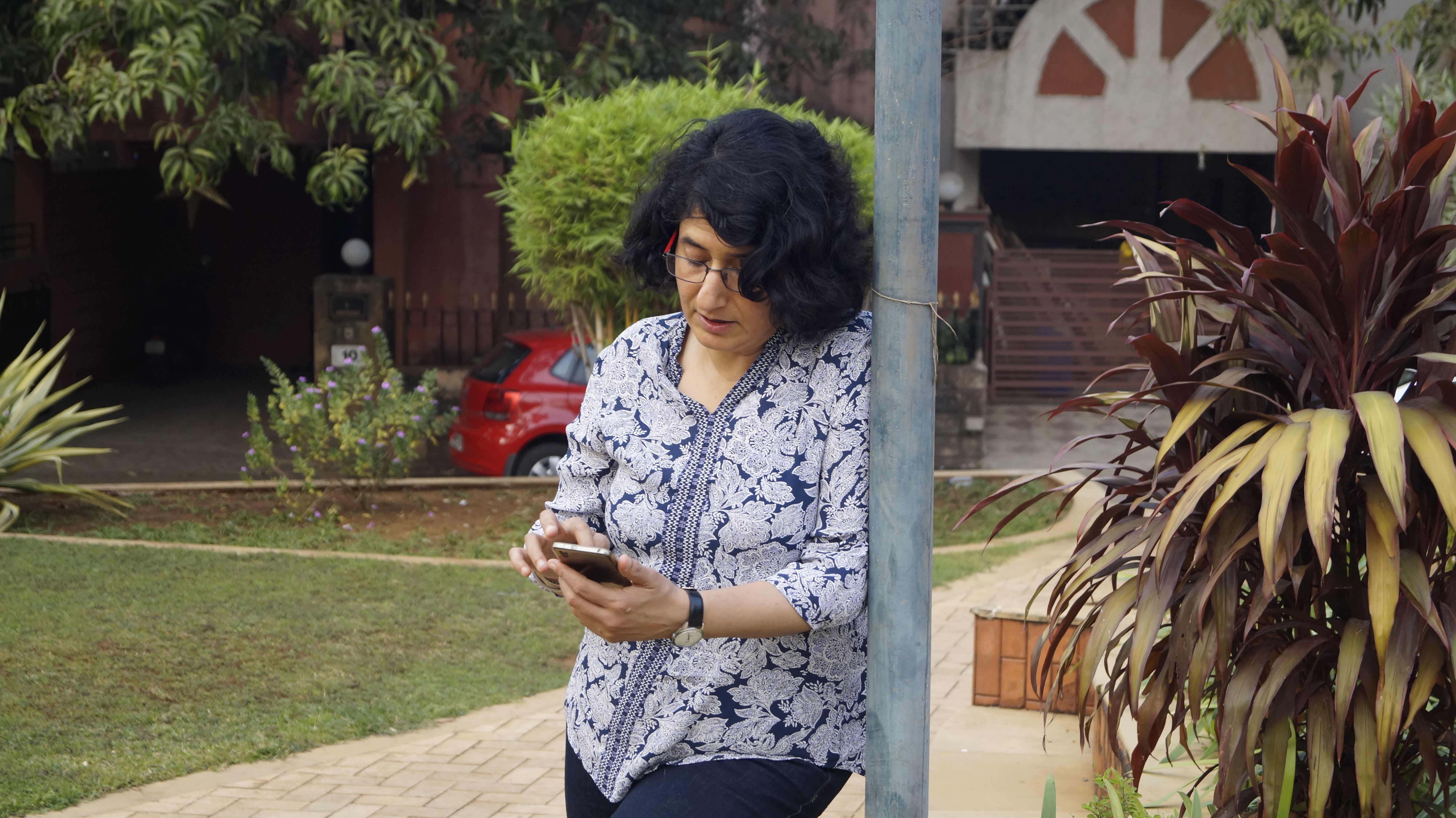Living in the ‘liminal’ space – Smriti Goel
 The author is an Executive Coach and a passionate Learning and Development professional with international experience across Africa, Middle-east and Asia. She has worked extensively with senior leaders to help them arrive at their destination of creating influence, impacting culture, and executing strategy.
The author is an Executive Coach and a passionate Learning and Development professional with international experience across Africa, Middle-east and Asia. She has worked extensively with senior leaders to help them arrive at their destination of creating influence, impacting culture, and executing strategy.
Smriti Goel is passionate about making a difference to the women community. She has had the opportunity to closely experience and observe the crusades that are inherent in most women’s lives. As a trailing spouse across 3 different continents, she has personally faced many hurdles in building her career and balancing work and family life. She has leveraged her personal and cross-cultural work experience, to successfully coach many women internationally, both in their personal and professional life. She has helped them to conquer their doubts and fears and make themselves resilient to overcome the challenges strewn in their path. Specifically, she has created and conducted personal leadership programs for women such as Femme Phenomenal, Women of Influence etc.
Currently based in Hyderabad, she is an MBA from IMT Ghaziabad and accredited as an Associate Certified Coach (ACC) from International Coaching Federation(ICF). In her previous roles, she has worked with KPMG, Genpact and Citibank (as a retained consultant) across geographies.
Smriti is certified in Level A & B (Intermediate) from British Psychological Society, Hogan Personality Assessments, MBTA Step 1 and Step 2, 15FQ+ and Baron EQi.
Do you ever feel suspended between here and there? Do you have the sense of drifting and searching for a path? Do you want to get somewhere and can’t see a guiding light? Are you ‘between or betwixt’?
Then it is quite likely that you are living in the ‘liminal’ space. Liminal comes from the latin word ‘limin’ meaning the threshold and ‘liminality’ is the sense of ambiguity or disorientation when making a transition from one stage or phase to another e.g the passage of youngsters into adulthood.
Arnold Van Gennep, an anthropologist, explored and developed the concept of ‘liminality’ in his work ‘Rites de passage.’ He proclaimed that, in traditional society, initiation rituals assisted individuals during ‘liminal’ periods. These social and cultural events created a formal pathway into the unknown realm – the individual knew that it is time for change and was able to freely explore the world with its infinite possibilities. The rituals also helped the community understand and cope with the liminal state of the individual.
Liminality was not just a transitional state or of progressive movement but a transformational one.
The concept was later popularised by Victor Turner, the author of the essay Betwixt and Between: The Liminal Period in Rites of Passage. He applied the concept of liminality to fields other than anthropology and redefined its importance.
How is this relevant to us today?
There are many changes that bring liminality centre stage in our life: employment and lifestyle changes such as loss of employment, transitioning job roles, relocation, and retirement, identity shifts when one becomes a spouse, parent, and empty nester. These are situations where we know the starting point but have no idea of the end point and are at a total loss about what to do in between. It can be a time of suspension, of not knowing, of feeling confused, of not being one or the other.
Alas, the modern society gives no one the luxury of just being, the expectations start early in life and continue even beyond death. The individual carries the weight of these expectations on his own narrow shoulders, while undergoing a transition where confusion, doubts and insecurity prevail. There is no ritual marking the beginning of the uncertain phase of our life, to let us know that now is our time to experiment or what will be the end point.
No one (not even we to ourselves) gives us the permission to break free of the shackles of the past job, past responsibility. Neither are we readily able to imagine the myriad possibilities and muster the courage to experiment so that we could metamorphosize into a new being and arrive at the end point.
So how can we make the best use of being in a liminal space?
For someone like me who as a trailing spouse and an empty nester for quite a few years, I often get thrown into a liminal space – giving up a job, giving up a team that I groomed and grew, to just plain emptiness. Going through the cycle of setting up a new home, putting my best foot forward to befriend new people often from varying cultures and finding my own feet workwise, isn’t always a comfortable situation. Finding the answer to the question as to what to do next doesn’t have easy or clear answers.
Liminality lends structural invisibility with no view of what will be the end point, and how it will look.
What works in my favour is my eternal optimism – I believe that if I take one step forward, no one can stop me from arriving somewhere! I also believe in the law of the farm – none of us have the magical prowess to transform a seed to a fruit bearing tree in an instant but all of us have it in us to plant the seed, nurture the soil, tend to the burgeoning sapling and keep a constant vigil to witness the growth over time. The key is believing that the seed has potential to become that tree.

When a caterpillar is born, it contains special cells called the ‘imaginal cells’. These cells are inactive at the time of birth but contain the blueprint of all the stages to become a butterfly. The potential to become a butterfly already exists but the caterpillar has to go through a stage of chaos, of transformation, of struggle and strife before the imaginal cells can takeover and transform the caterpillar into a butterfly.
My belief is that the potential exists in each one of us, it is for us to strive, to try, to plant the seed and nurture the soil but we first need to believe. A significant experience may have set us up for confusion, insecurity and chaos, but it could just be the threshold of our path to become a butterfly!
So, when in a liminal space, I have asked myself, what seed can I plant and how can I nurture the soil? What are the possible paths to growing a tree that will bear fruits?
Here are my 7 Steps to make the best of living in the ‘liminal space’:
- Mark the threshold– Mark the event that threw you into the liminal space – like a ritual. Acknowledge that you have stepped into a new phase and wonder about all the possibilities that it has opened up for you. Make a list of what you could not do earlier but now you have the time and space to do it.
- Imagine the possibilities– It’s possible that you are caught in the shackles of the past and cannot see beyond the unsettling issues and the problems you are facing. You need to engage with inspiring, creative and positive people to discover those possibilities. If you can find no one, then engage a coach.
- Set a routine– Start your day with activities that release endorphins – meditate, thank your stars for what you have, and exercise. Then set aside time for productive work – nurture the soil – it could be as simple as doing research or having a focused conversation with someone about what you are thinking or feeling.
Whenever I set foot in a new country, I enrolled myself in educating myself further. Never has that been a disappointment, it always resulted in increased confidence, a new network and opportunities.
- Ask yourself the right question– Sometimes when we are lost in the jungle of doubts and insecurities, we spend a lot of time complaining about what’s not working for us – past events, lost glory, current circumstances and responsibilities that are preventing us from doing what we want to do. It might be helpful to ask yourself questions like –
- ‘If this isn’t working, then what will?’
- ‘If I am not happy now, when will I be?’,
- ‘If I can’t do this and I can’t do that, what is it that I CAN do?’
You will be surprised at the answers you find within yourself.

- Visualize the endpoint– Imagine a new you, a new place and a new identity, the one that has the potential to make you happy and fulfilled. Here you need courage and someone who can hold you in a positive space while you imagine what looks impossible.
- Keep at it – There is no short cut to getting out from a liminal space. Becoming a butterfly from a stage of a caterpillar requires new experiences as much as it needs hard work – continue to experiment, say yes to things that you have never done before. Remember when the time comes those ‘imaginal cells’ will take a life of their own.
- Celebrate your success – When you make a breakthrough, even if it’s a small one, feel happy about it, let that energy drive you to do more. Celebrate with those who care and assimilate the warmth of appreciation within you. Look back at the path you traversed and smile to yourself at the obstacles that you have overcome – the ones that looked insurmountable, appear quite manageable in the rear-view mirror.
“Once you have mastered time, you will understand how true it is that most people overestimate what they can accomplish in a year – and underestimate what they can achieve in a decade!” — Tony Robbins
Following these 7 steps has freed me from the shackles of the past and helped me re-invent myself time and again. In today’s modern world, we may not have the benefit of initiation rituals, but we can certainly mark the stages mentally. We can rejoice in the new-found freedom and find productive ways of using our time to be ready for the opportunities that may be presented to us in the future.
I keep the knowledge that I have done it before, very close to my heart, so that whenever next life throws liminality at me, I only treat it as an opportunity to unleash my ‘imaginal cells’. I know there is a point of arrival for a more evolved identity, only I don’t know how it looks. Ultimately it is my responsibility to recognize the opportunities that come my way and make the most of them.
References:
1. Educational Transactional Analysis: An International Guide to Theory and Practice by Giles Barrow
2. First things First by Stephen Covey
3. http://www.liminality.org/about/whatisliminality/


